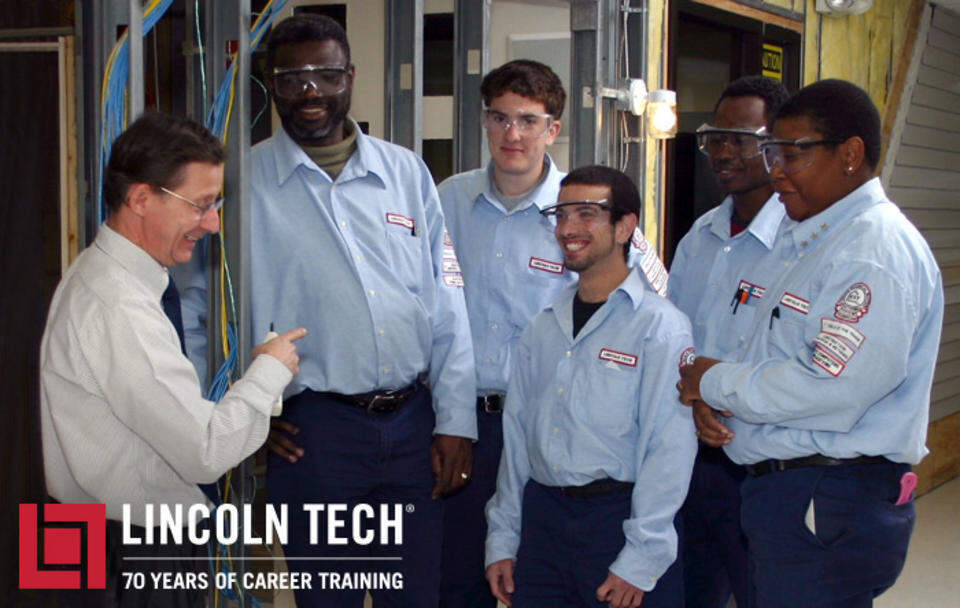Electrician Jobs Education For Career Success


Electrician Jobs Education: Lincoln Tech Instructors Talk About Their Trade
More than ever, trained electricians are needed around the country! The race to get a leg up in the industry is competitive and in an ever-changing field, it’s important to know what to expect in the educational program you choose. We recently spoke with Lincoln Tech instructors Marc T. Nowak and Simon Thomas to get their take on electrician jobs training. Nowak is a MA licensed Journeyman Electrician and an Instructor at Lincoln Tech in East Windsor, CT. Thomas, an Electrician and NCCER Master Craft Instructor, trains students in Electrical & Electronics Technology at the Union, NJ campus. Thomas and Nowak gave insight into today’s electrician jobs training and the electrical and electronics industries.
What are the benefits of a formal education for electrician jobs?
Nowak: Benefits range from the simple – being more knowledgeable than someone without an education – to the more complex: having a support system to guide you through your career.
Thomas: A technical training program such as the one offered by Lincoln Tech teaches you the skills and knowledge necessary to work with electricity safely and with confidence. Guided by experienced electrical instructors, students learn the theory behind what they do and receive lots of hands-on and troubleshooting experience.
Nowak: A formal education gives the student a chance to learn a much broader scope of work and work-related skills. For as many things in our trade that you must learn “in the field,” there are too many things about our trade that can’t be learned just there. It’s why states require class hours, not just on the job training, for licensing. You can’t lose an education. You may get a job, but if there is no more work, you lose that job. But if you get an education, you can take that with you to any job.
How does a formal education prepare graduates for an electrical apprenticeship?
Nowak: Many young people don’t know what it is to work in an industry as a real professional. At a trade school, you’re shown how to stand out from the crowd, how to appear better than those around you and be the best choice for an employer. It’s more than showing you how to do something. It’s explaining why you do it and gaining understanding for the way employers perceive their employees. We help students build confidence in their personal skills and help them build the social skills they will need to interact with customers and employers.
Thomas: A formal education allows the student to hit the ground running and makes them a much more desirable candidate for an electrical apprenticeship program since they already have basic electrical knowledge as well as experience in using basic hand and electrical tools.
What is the curriculum like in Electrical Technology/ Electronics/ Electrician jobs programs?
Nowak: Most Electrical Technology courses focus on the two most important things: safety and the National Electrical Code (NEC). It is also important to cover science and math, to help explain the workings of things like electrons, conductors, and magnets. After Basic Theory courses, students are usually introduced to materials (like Romex, MC, EMT) and basic installation methods such as switching, receptacles, disconnects and starters.
Courses are constantly changing in our industry. New avenues of education being brought to these courses involve green technologies: solar panels, wind turbines, and fuel cells. Along with a constantly rewritten NEC, the curriculums are always being updated with help from contractors and professionals in the field.
Thomas: Lincoln Tech’s program combines training in basic residential and commercial electricity with exposure and training in a broad variety of skills and experiences to make them a desirable candidate for a great variety of electrical industry employers. A student has the opportunity to earn credentials from the NCCER in Core Curriculum, Electrical Levels 1 & 2.
How long does it take the average electrical technology student to graduate?
Nowak: That depends on the course and the school. The longest, taking five years; the shortest, six months. I would say two years would be average, with the majority of students finishing in 12-16 months.
Thomas: Our intensive program meets for 1080 hours over the course of 12 months for daytime students who attend 22 ½ hours per week. Or, approximately 18 months for our evening students who attend 16 hours per week. In addition to class time, students are also responsible for completing out of class reading and assignments.
What advice do you have for someone considering training for electrician jobs?
Nowak: Know who you are. I went to a four-year college and spent five years getting a Bachelor’s degree because I didn’t know myself well enough. If you choose to do something make sure you want to do it. The students who always work their hardest are always the first to find employment. It’s easy to work hard at something if you love doing it.
Thomas: There are so many opportunities for someone considering a career in the electrical field that an intensive program such as ours gives the student excellent fundamental knowledge and very broad exposure to multiple electrical specialties rather than limiting the untrained individual to what they could learn on the job in one specific industry.
